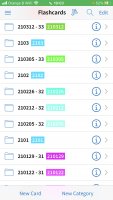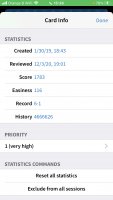Hi! I have been happily using Pleco for several years now and I love this product and do not regret any investment I made buying functionalities and dictionaries.
For the last two years, I have been studying at the Confucius Institute and they use NPCR (New Practical Chinese Reader). It is pretty intense in terms of vocabulary. I am about HSK 4 level, but with NPCR, the grammar level is closer to HSK 3 whereas the vocabulary (thanks to Pleco's tags) has a lot of words in HSK 5 and 6.
For each class, I create a new category with the date of the course.
This means that each class brings about 50 news words every week and when I include the old words I forgot as well the new combinations of characters, the category I create for each class goes above 100.
I make a point of studying the flashcards about 20' every day. There are words, of course, that are hard to memorize, and I make them high priority. But then, if I am let's say at course number 10, there are also words from course number 1 or 2 that "fell off the truck".
So, because of the number of words, spaced repetition reaches a physical limit. I cannot have 1000 words to work with. So I study the flashcards from the last course and when I have time, I also go backwards, but not too far because by then, I have a new course.
NPCR is well built in the sense that each chapter keeps bringing back some previously studied words, but still, there are many "hard to learn" words that go under the radar.
To go around that hurdle, I create a category that is made of "high priority" flashcards. But I have to do this manually at regular intervals. It would be nice to have "smart categories" that would correspond to a given set of criteria and would automatically update. I could, for instance, study all the cards that correspond to high-priority and are in a given range of categories. What do you guys think?

For the last two years, I have been studying at the Confucius Institute and they use NPCR (New Practical Chinese Reader). It is pretty intense in terms of vocabulary. I am about HSK 4 level, but with NPCR, the grammar level is closer to HSK 3 whereas the vocabulary (thanks to Pleco's tags) has a lot of words in HSK 5 and 6.
For each class, I create a new category with the date of the course.
This means that each class brings about 50 news words every week and when I include the old words I forgot as well the new combinations of characters, the category I create for each class goes above 100.
I make a point of studying the flashcards about 20' every day. There are words, of course, that are hard to memorize, and I make them high priority. But then, if I am let's say at course number 10, there are also words from course number 1 or 2 that "fell off the truck".
So, because of the number of words, spaced repetition reaches a physical limit. I cannot have 1000 words to work with. So I study the flashcards from the last course and when I have time, I also go backwards, but not too far because by then, I have a new course.
NPCR is well built in the sense that each chapter keeps bringing back some previously studied words, but still, there are many "hard to learn" words that go under the radar.
To go around that hurdle, I create a category that is made of "high priority" flashcards. But I have to do this manually at regular intervals. It would be nice to have "smart categories" that would correspond to a given set of criteria and would automatically update. I could, for instance, study all the cards that correspond to high-priority and are in a given range of categories. What do you guys think?


